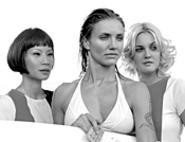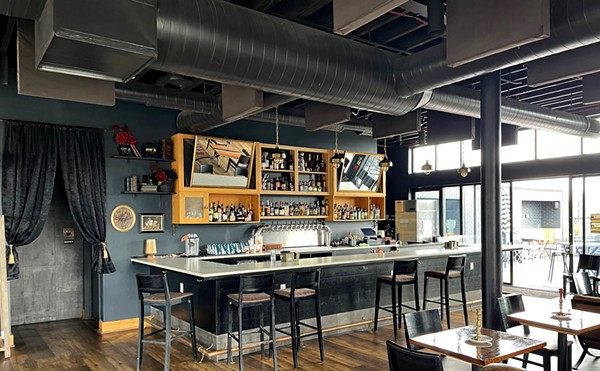As the Columbia Pictures logo looms large in frame until its torch becomes the focal point, we find ourselves in what appears to be a tent full of sweaty medieval warriors forging axes, and we have to wonder: Did they already make another Scorpion King movie and not tell us? No, apparently this is just the way things are in contemporary Mongolia. As Drew Barrymore engages in a drinking contest with a facially-tattooed ethnic gentleman, we wonder yet again: Is this some kind of bizarre attempt to pay tribute to Raiders of the Lost Ark and Once Were Warriors all at once? And as the scene gradually proceeds to a truck-and-helicopter escape sequence that the film's initial trailer has already shown in its entirety, we have to wonder what the point of it all is.
Nothing deeper than a stale retread, it seems. And this observation comes from a critic who listed the original Charlie's Angels movie as one of the top five films of 2000. I take no particular joy in slamming Barrymore and director McG's pet franchise, but though it periodically entertains, Charlie's Angels: Full Throttle peters out quickly.
Forget the usual critical gripes. If you're one who's going to complain about the egregious violation of the laws of physics, you've no business in the theater to begin with. Ditto anyone who disdains gratuitous and fetishistic costume changes, or unmotivated suggestive poses. And if you're actually about to call Drew Barrymore overweight, go back and watch Queen Latifah's musical number in Chicago again, and then we'll talk. Dismissing the unreality of the cartoonish world that the big-screen Angels inhabit is missing the point -- the sheer glee with which the first film not only glossed over its own illogic but actually played it up was the main reason it was so much fun.
Initially -- at least, following the opening chase -- things seem to be as they should. Once more, we get cheesy fake flashbacks that resemble TV-show opening credits; shortly afterward, Cameron Diaz is shaking her ass to MC Hammer's "U Can't Touch This." (Ass fetishism, by the way, is even more evident in this film than in the last.) Cameos -- among them Pink, Bruce Willis, Robert Forster, and Eric Bogosian -- come fast and furious, as do costume changes, which, Venice Beach fans may be glad to know, include those multicolored Hot Dog on a Stick uniforms previously immortalized in an Anna Waronker video.
In keeping with contemporary cinematic trends, the plot revolves around the possession of precious rings -- everything else in the story is unnecessarily convoluted and makes little sense anyway. Diaz gets another "spontaneous" dance number, which isn't much fun; Lucy Liu gets to use a whip again, which is predictable; Barrymore gets to make out with new bad boy Justin Theroux, which feels like ego gratification. Crispin Glover briefly reprises his Thin Man role and gets one good scene toward the film's end, but it feels even more gratuitous than the car-wash scene tacked onto the end credits.
Good villains are sorely needed here. Theroux affects a decent Northern Irish accent as Barrymore's evil ex, but the other key villain isn't revealed until more than an hour into the film, despite every iota of publicity having focused on the fact that it's Demi Moore. Moore is looking good, but come on -- this does not equal the Sam Rockwell-Kelly Lynch-Crispin Glover combo of the original (McG should at least have sprung for Moore's beau, Ashton Kutcher, to tag along). Once again, though, a British comic actor is made to look extremely dopey -- Tim Curry was not too grating in the first, but John Cleese is utterly wasted here in his role as Lucy Liu's dad, a racial anomaly no more explicable than Bernie Mac showing up as Bill Murray's brother. (Murray, who apparently didn't get along with Liu, is MIA here, save for a photograph on the wall.)
The movie's not a disaster -- an extended sequence at the beach is a lot of fun, and there's a motocross chase that abuses the bullet-time effect in ways the Wachowski brothers wouldn't dare dream of. Full Throttle does, however, feel like a calculated attempt to reproduce an experience of which the most charming aspect was its apparent spontaneity. When the villain's best line -- "When I was an angel, we used guns" -- requires you to remember Barrymore's vehement insistence, three years ago, on not having the leads wield firearms, and when you're actually hoping for Tom Green to show up (he doesn't), something has gone wrong. Even the soundtrack, usually a high point of any film involving Barrymore, misfires: Did anyone really want to hear Nickelback's rendition of "Saturday Night's Alright (for Fighting)"?










